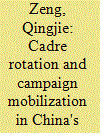| Srl | Item |
| 1 |
ID:
153318


|
|
|
|
|
| Summary/Abstract |
In authoritarian regimes, anticorruption measures are fundamentally mechanisms of controlling agents at various levels. To do this, the principal can either rely on routine bureaucratic management or resort to ad hoc, intense mobilization to discipline its agents. Using China as a case study, this article explores which mode of top-down control exerts greater influence on the pattern of anticorruption enforcement. We focus on the cadre rotation system as an example of routine management techniques and examine its effects on provincial level enforcement. We also investigate how provinces respond to the central government's periodic call to intensify anticorruption efforts. Based on provincial enforcement data from 1998 to 2013, our analysis finds that the proportion of rotated officials has little impact on enforcement outcomes. Rather, the vigor of enforcement in the provinces responds strongly to national policy priorities, suggesting a highly centralized disciplinary system. Moreover, provinces of greater political importance are under more central pressure to conform. The findings challenge the often-made argument that stable institutions are effective in fostering top-down control in authoritarian regimes, and suggest that campaign mobilization continues to be an essential instrument at the dictator's disposal.
|
|
|
|
|
|
|
|
|
|
|
|
|
|
|
|
| 2 |
ID:
144539


|
|
|
|
|
| Summary/Abstract |
Since the early 1990s, the Chinese Communist Party (CCP) has put in place a series of measures to allow more Party members to participate in the cadre selection process. “Intra-party democracy” was promoted as a remedy to solve the corruption and social tension that resulted from overly concentrated personnel power. How effective are these formal procedures in constraining the appointment power of core Party leaders and institutionalizing the influence of a larger group of cadres? Drawing on archival research, interviews and quantitative data, this paper examines two components of intra-party democratic reform: “democratic recommendation,” which serves as a gateway to cadre promotion, and the semi-competitive elections at Party congresses. This in-depth study finds that the efforts to expand bottom-up participation are hindered by loopholes in formal regulations, informal practices and the frequent rotation of Party officials. Meanwhile, the reform measures have brought changes to the personnel system by complicating the Party secretaries' exercise of appointment power and altering the incentives of ambitious cadres. The implementation of intra-party democracy could improve the vitality of one-party rule, and its ebbs and flows imply a divide within China's top leadership over the direction of political change.
|
|
|
|
|
|
|
|
|
|
|
|
|
|
|
|
| 3 |
ID:
172069


|
|
|
|
|
| Summary/Abstract |
In the reform era, the Chinese state often resorts to managed campaigns to implement important policies. This article examines how managed campaign influences the mode of bureaucratic operation in China. Avoiding a simplistic dichotomy between campaign mobilization and bureaucratic institutionalization, this study unpacks the Weberian bureaucratic concept and shows that some core dimensions of the model are compatible with managed campaign. While the pressure of mobilization tend to compromise functional differentiation and strict adherence to stable rules, they can reinforce other dimensions such as top-down control in a multilevel hierarchy and procedural integrity. The Chinese Communist Party (CCP) has configured the bureaucracy to serve its organizational and political needs, resulting in a mode of operation that partially conforms to the Western standard of public administration.
|
|
|
|
|
|
|
|
|
|
|
|
|
|
|
|